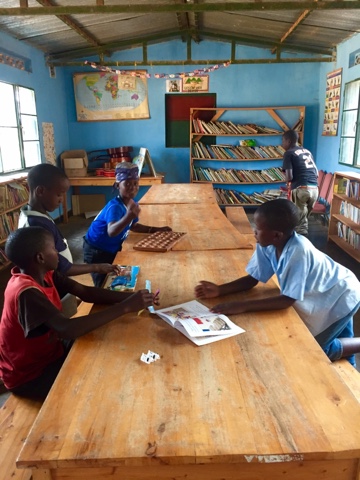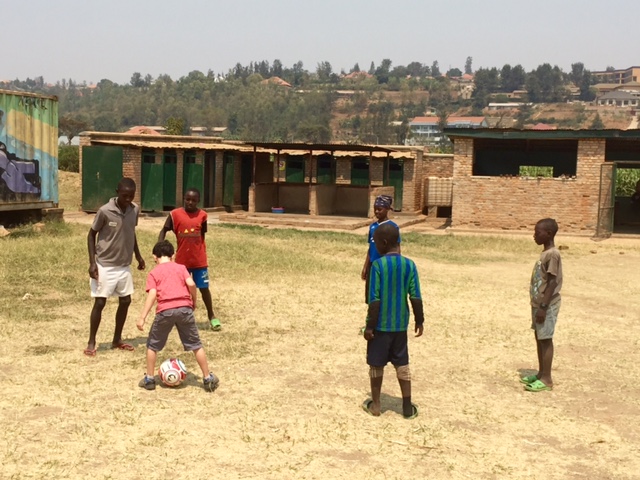It is a country that suffered through a genocide just twenty-two years ago, but is now a model for reconciliation with killers and victims living side by side as Rwandans, not Tutsi and Hutus. In twenty years, the number of colleges and universities grew from one (for elites only) to over thirty. The economy is growing at a rate of 8%, and the focus on gender equality is reflected in the fact that Rwanda leads the world with highest percentage of women in parliament. Plastic bags are illegal (ours were confiscated at the airport) to protect the environment. This picture of progressiveness, however, is contradicted by the perceived hard line tactics of the government, itself a former rebel group, believed to violently silence opposition.
Our personal connection with Rwanda began just over three years ago when DS visited the country on a coffee-origin trip while working at Starbucks Coffee.
Rwanda's people, history and culture resonated deeply with DS, and so in November 2014 he decided to spend a month by himself exploring and working in this central African country. With the help of a couple of Rwandan friends he'd met during his first visit, DS engaged with a number of local organizations and communities to do everything from business coaching and mentoring projects, to culling ideas from the communities themselves for community-led improvement projects to which we could hopefully lend support.
It was important to DS (and me) that our volunteer efforts weren't limited to volunteer tourism. There is merit to volunteer tourism, but we envisioned a long-term commitment and something more substantive than flying in, flying out. Moreover, it was critical that the projects in which we engaged weren't our ideas, but community-driven ideas--organized and implemented by the local community.
DS laid the foundation and is now enjoying his third trip to Rwanda. The kids and I are thrilled, even if a little intimidated, to join him for our first visit.
One of the outstanding organizations with which we've been working is Les Enfants de Dieu. The organization is secular, but adopted 'God' in the name to symbolize the protective and compassionate qualities of all religions and spiritual movements. Doug had the pleasure to reunite with many of the boys he'd worked with two years ago, some of whom are about to take exams and/or start university.
Les Enfants de Dieu is a rehabilitation center located just outside Rwanda's capital of Kigali. It was established as a transitional home for street kids. As Les Enfants de Dieu explains on their website:
Rwanda has no traditional orphanages. It is both a widely accepted notion and a law that orphans and children in need should eventually return to their communities. Therefore, centers like Les Enfants de Dieu take kids in for varying amounts of time, perhaps one to four years, until they are ready to safely and productively return to society."The direct and indirect effects of the genocide, HIV/Aids, and poverty in Rwanda mean that the number of orphans and vulnerable children outnumber the capacity of caregivers and foster homes. Communities are not able to cope with the situation leading to thousands of children taking to the streets of major towns and cities, predominantly the capital, Kigali"
As all of these photos demonstrate, this center uses an extremely personal approach to the boys, each one embarking on the rehabilitation of their mind, body and spirit as an individual. The center can take up to 120 boys."If a child is willing to leave the streets, we first remove him from the harsh reality of street life, where he is exposed to drugs, prostitution and crime, and bring him to the safety and security of our centre. We provide the child with food, shelter and basic healthcare. The second and most transformational stage is the rehabilitation of the child. We believe in rehabilitation of body, mind and spirit in order to release the child of the trauma of street life."
Art for purchase, created by the boys. AS purchased this one:
The boys rise at 5:30.
The international language of football:
Our first English-Kinyarwanda dictionary:
DS made the Target run, and for this particular trip we came equipped with two huge duffle bags full of underwear and socks for all 96 boys, plus classroom supplies. The Minister of Administration checked each item into the ledger, with a little help from AS and RS.
"We give a tremendous amount of responsibility to the children themselves regarding decisions pertaining to their future as well as the management of the whole project. The general population (resident children at the centre) organize elections each year to nominate leaders from amongst themselves. They elect seven ministers to deal with various aspects of life at the centre."
The boys eat two big meals per day--lunch and dinner--and some porridge in the morning. Rwandans primarily eat vegetarian, and so similarly these boys eat red beans and rice for most meals. Sometimes red beans and corn meal. They eat with their hands as silverware is not available.
In a sweet gesture, they gave us forks.
"We uphold that every child is entitled to all the rights and freedoms set forth in the Declaration of Human Rights 'without distinctions of any kind, such as race, colour, sex, language, religion, political or other opinion, national or social origin, property, birth or status'."







































No comments:
Post a Comment